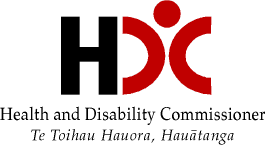
9 August 2024
Sarah Brodrick
By email:
[FYI request #27610 email]
Tēnā koe Ms Brodrick
Re:
Information request
Our ref:
E24HDC00979/NRO
Thank you for your request
of
14 July 2024 through FYI.org.nz for information relating
to HDC’s processes to support “Māori, people and service provides within the
complaint management process.”
We have considered your request under the Official Information Act 1982.
Please find the information requested
below.
Hui ā whānau and hohou te rongo
Any official information about hui ā whānau and hohou te rongo
We do not have any specific policies or documents about these processes, but relevant
information is included in the following documents:
2022 Annual Report -
https://www.hdc.org.nz/media/gu5l4i d/hdc-annual-
report-2022.pdf
2023 Annual Report -
https://www.hdc.org.nz/media/wzpdch0g/hdc-annual-
report-2023.pdf
2023/24
Statement
of
Performance
Expectations
-
https://www.hdc.org.nz/media/kmgnvawu/statement-of-performance-
expectations-2023-2024.pdf
Case study -
https://www.hdc.org.nz/decisions/case-studies-nga-matai-
take/culturally-appropriate-care-making-recommendations-and-tailoring-
our-approach-to-meet-the-needs-of-whanau/
Media release -
https://www.hdc.org.nz/media/si1goudc/20hdc00719media-
release.pdf
How hui ā whānau and hohou te rongo are “facilitated by Māori”
In May 2022 HDC introduced a new role to the organisation’s leadership team, Kaitohu
Matamua Māori – Director Māori. Since its introduction, this role has been fil ed by
Ikimoke Tamaki-Takarei. Mr Tamaki-Takarei leads the Māori Directorate, which also
Auckland Office: P O Box 1791 Auckland 1140; Wel ington Office (new address): PO Box 245, Wel ington 6140
Freephone: 0800 11 22 33; Email: [Health and Disability Commissioner request email]; Website: www.hdc.org.nz

2
includes two Senior Advisors, to provide cultural support to the Health and Disability
Commissioner and her employees to ensure the organisation meets its obligations
under Te Tiriti O Waitangi. In doing so, the Māori Directorate facilitates hui ā whānau
to support HDC and Māori consumers and complainants to access and navigate the
complaints process in a way that is culturally appropriate. They also help to facilitate
hohou te rongo, which is an approach that focuses on bringing peace between the
consumer and provider to complaints resolution.
What date HDC commenced hui ā whanau and hohou te rongo
As previously mentioned, the Kaitohu Matamua Māori was a role introduced in May
2022. HDC has an ongoing objective to provide Māori-focused complaints resolution
where possible and appropriate, and prior to 2022 we did so by facilitating whānau
meetings and promoting culturally appropriate care in the health sector. The
recruitment of a Kaitohu Matamua Māori furthers this objective as it enables us to
provide more effective and appropriate processes that are facilitated by Māori.
The Kaitohu Matamua Māori began facilitating hui ā whānau and hohou te rongo as
the need arose, rather than on a specific date.
Whether hui ā whānau and hohou te rongo are permanent changes and, if not, how
long they wil be available to Māori and their whānau
As above, these processes have been facilitated by the Māori Directorate team. That
team are all employed on a permanent full-time basis and their support is greatly
valued by both HDC, and complainants and their whānau.
Clinical Navigators
Any official information about the Clinical Navigator role
Please find enclosed a copy of the Clinical Navigator position description. This details
the responsibilities and qualities of the position.
What qualifications or experience does a Clinical Navigator require, and why has the
HDC chosen to call them “Clinical Navigators”
HDC’s Navigators are required to have healthcare experience in the Aged Care
environment, or with a lot of experience working with older people. Both of HDC’s
current Navigators have nursing experience. HDC calls them Clinical Navigators as they
have experience in the healthcare industry and are able to help HDC staff, consumers
and complainants to understand aspects of the healthcare system because of their
experience working in it. Navigators may be asked to reach out to a complainant to
clarify the issues complained about, and are well equipped to ask effective questions
and to explain aspects of the care provided. Navigators also assist HDC staff to identify
any concerning clinical aspects of complaints. For example, they are involved in our
‘triage’ process to identify issues which may not be as clear to someone with limited
or no clinical experience.
What date were Navigators commenced

3
HDC’s first Navigator was employed on 17 October 2022.
Any specific qualifying factors for a complainant to access a Clinical Navigator
There are not any “qualifying factors” for a complainant to access a Clinical Navigator,
but they are not available by request. Navigators may reach out to a complainant
when HDC identifies that they would benefit from talking to someone with the
experience required to understand and discuss clinical issues, as opposed to a
complaints assessor who may not have the requisite clinical experience.
Whether Clinical Navigators are a permanent change and, if not, how long they will be
available to Māori and their whānau
HDC currently has two Clinical Navigators who are both employed on a permanent
full-time basis. Their presence has been greatly valued by HDC. Support of a Clinical
Navigator is available on all complaints where it is identified as beneficial, including on
complaints laid by Māori or their whānau.
Complainant and provider surveys
Copies of all surveys including the questions that have been asked of complainants
The surveys are a quality improvement tool which assists us to make our process more
people-centred. It allows us to both identify quality improvement initiatives and
monitor the impact on people’s experience of any initiatives implemented.
Please find the enclosed copy of the complainant survey.
Which date each complainant survey went live and how they are communicated
The complainant experience survey was first introduced in February 2021. The
complainant experience survey is sent on a 3-4 monthly basis to complainants who
have has a complaint closed with HDC in that time period.
The survey is communicated through the medium which the person has chosen to
communicate with us. For example, if a complainant has had all their correspondence
with HDC via email, then they will be emailed a link to a digital version of the survey.
Those who have primarily corresponded via mail will be posted a paper survey with a
stamped, self-addressed envelope so there is no cost for them to send it back. If
someone wants support to fill out the survey, or to answer the survey in a different
medium, we can accommodate that. Some people have chosen to give their answers
over the phone or on Zoom.
Whether the complainant survey requested identifiable information
The surveys are designed to be anonymous. Whilst they do ask questions about
general demographics (age, gender, etc), they do not
require input of identifiable
information. The survey data is also analysed by a team who is not directly involved in
complaints resolution. The only time identifying information is requested in the survey
is where it asks if the complainant would be happy to be contacted about their
experience. If they are completing the survey online and answer ‘yes’ to being


4
contacted, they are then prompted to fill in contact details. If they answer “no”, no
such prompt to enter those details comes up.
In the paper version of the survey, there is a part which asks for contact details
immediately after the question asking whether they would like to be contacted.
However, the absence of an asterisk on the part of the survey which asks for those
details illustrates that answering that part of the survey is voluntary. The surveys do
not ask for complaint reference numbers.
Copies of all surveys including the questions that have been asked of providers
Please find attached the provider surveys. There are three different provider surveys
depending on if the provider is an individual provider, a small group provider (like a
GP clinic), or a large group provider (like a hospital).
What date the provider survey went live and how they are communicated
The provider experience survey was introduced December 2021. The provider
experience survey is sent on a 3-4 monthly basis to providers who had a complaint
closed with HDC during that time period.
As above, these surveys are sent in the provider’s preferred method of contact, which
is determined and handled in the same way complainants surveys are (see above).
Whether the provider survey requested identifiable information
The provider surveys take the same approach to identifiable information as the
complainant survey. See answer above for “
Whether the complainant survey
requested identifiable information” and the attached copies of the surveys for details
.
You may seek a review of this decision from the Office of the Ombudsman.
Nāku iti noa, nā
Juliette Manning
Senior Legal Advisor
Enc
Navigator position description July 2022
Complainant and provider surveys




